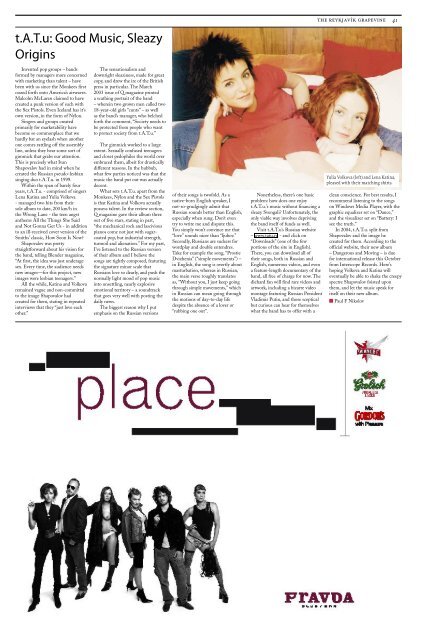7 august - The Reykjavik Grapevine
7 august - The Reykjavik Grapevine
7 august - The Reykjavik Grapevine
You also want an ePaper? Increase the reach of your titles
YUMPU automatically turns print PDFs into web optimized ePapers that Google loves.
t.A.T.u: Good Music, Sleazy<br />
Origins<br />
Invented pop groups – bands<br />
formed by managers more concerned<br />
with marketing than talent – have<br />
been with us since the Monkees first<br />
oozed forth onto America’s airwaves.<br />
Malcolm McLaren claimed to have<br />
created a punk version of such with<br />
the Sex Pistols. Even Iceland has it’s<br />
own version, in the form of Nýlon.<br />
Singers and groups created<br />
primarily for marketability have<br />
become so commonplace that we<br />
hardly bat an eyelash when another<br />
one comes rattling off the assembly<br />
line, unless they bear some sort of<br />
gimmick that grabs our attention.<br />
This is precisely what Ivan<br />
Shapovalov had in mind when he<br />
created the Russian pseudo-lesbian<br />
singing duo t.A.T.u. in 1999.<br />
Within the span of barely four<br />
years, t.A.T.u. - comprised of singers<br />
Lena Katina and Yulia Volkova<br />
- managed two hits from their<br />
sole album to date, 200 km/h in<br />
the Wrong Lane - the teen angst<br />
anthems All the Things She Said<br />
and Not Gonna Get Us - in addition<br />
to an ill-received cover version of the<br />
Smiths’ classic, How Soon Is Now?<br />
Shapovalov was pretty<br />
straightforward about his vision for<br />
the band, telling Blender magazine,<br />
“At first, the idea was just underage<br />
sex. Every time, the audience needs<br />
new images—for this project, new<br />
images were lesbian teenagers.”<br />
All the while, Katina and Volkova<br />
remained vague and non-committal<br />
to the image Shapovalov had<br />
created for them, stating in repeated<br />
interviews that they “just love each<br />
other.”<br />
<strong>The</strong> sensationalism and<br />
downright sleaziness, made for great<br />
copy, and drew the ire of the British<br />
press in particular. <strong>The</strong> March<br />
2003 issue of Q magazine printed<br />
a scathing portrait of the band<br />
– wherein two grown men called two<br />
18-year-old girls “cunts” – as well<br />
as the band’s manager, who belched<br />
forth the comment, “Society needs to<br />
be protected from people who want<br />
to protect society from t.A.T.u.”<br />
<strong>The</strong> gimmick worked to a large<br />
extent. Sexually confused teenagers<br />
and closet pedophiles the world over<br />
embraced them, albeit for drastically<br />
different reasons. In the hubbub,<br />
what few parties noticed was that the<br />
music the band put out was actually<br />
decent.<br />
What sets t.A.T.u. apart from the<br />
Monkees, Nýlon and the Sex Pistols<br />
is that Katina and Volkova actually<br />
possess talent. In the review section,<br />
Q magazine gave their album three<br />
out of five stars, stating in part,<br />
“the mechanical rock and lascivious<br />
pianos come not just with sugarcoated<br />
pop, but industrial strength,<br />
turmoil and alienation.” For my part,<br />
I’ve listened to the Russian version<br />
of their album and I believe the<br />
songs are tightly composed, featuring<br />
the signature minor scale that<br />
Russians love so dearly, and push the<br />
normally light mood of pop music<br />
into unsettling, nearly explosive<br />
emotional territory – a soundtrack<br />
that goes very well with posting the<br />
daily news.<br />
<strong>The</strong> biggest reason why I put<br />
emphasis on the Russian versions<br />
of their songs is twofold. As a<br />
native-born English speaker, I<br />
not-so-grudgingly admit that<br />
Russian sounds better than English,<br />
especially when sung. Don’t even<br />
try to write me and dispute this.<br />
You simply won’t convince me that<br />
“love” sounds nicer than “ljubov.”<br />
Secondly, Russians are suckers for<br />
wordplay and double entendres.<br />
Take for example the song, “Prostie<br />
Dvizhenia” (“simple movements”) –<br />
in English, the song is overtly about<br />
masturbation, whereas in Russian,<br />
the main verse roughly translates<br />
as, “Without you, I just keep going<br />
through simple movements,” which<br />
in Russian can mean going through<br />
the motions of day-to-day life<br />
despite the absence of a lover or<br />
“rubbing one out”.<br />
Nonetheless, there’s one basic<br />
problem: how does one enjoy<br />
t.A.T.u.’s music without financing a<br />
sleazy Svengali? Unfortunately, the<br />
only viable way involves depriving<br />
the band itself of funds as well.<br />
Visit t.A.T.u’s Russian website<br />
– www.tatu.ru - and click on<br />
“Downloads” (one of the few<br />
portions of the site in English).<br />
<strong>The</strong>re, you can download all of<br />
their songs, both in Russian and<br />
English, numerous videos, and even<br />
a feature-length documentary of the<br />
band, all free of charge for now. <strong>The</strong><br />
diehard fan will find rare videos and<br />
artwork, including a bizarre video<br />
montage featuring Russian President<br />
Vladimir Putin, and those sceptical<br />
but curious can hear for themselves<br />
what the band has to offer with a<br />
clean conscience. For best results, I<br />
recommend listening to the songs<br />
on Windows Media Player, with the<br />
graphic equalizer set on “Dance,”<br />
and the visualizer set on “Battery: I<br />
see the truth.”<br />
In 2004, t.A.T.u. split from<br />
Shapovalov and the image he<br />
created for them. According to the<br />
official website, their new album<br />
– Dangerous and Moving – is due<br />
for international release this October<br />
from Interscope Records. Here’s<br />
hoping Volkova and Katina will<br />
eventually be able to shake the creepy<br />
spectre Shapovalov foisted upon<br />
them, and let the music speak for<br />
itself on their new album.<br />
Paul F Nikolov<br />
41










